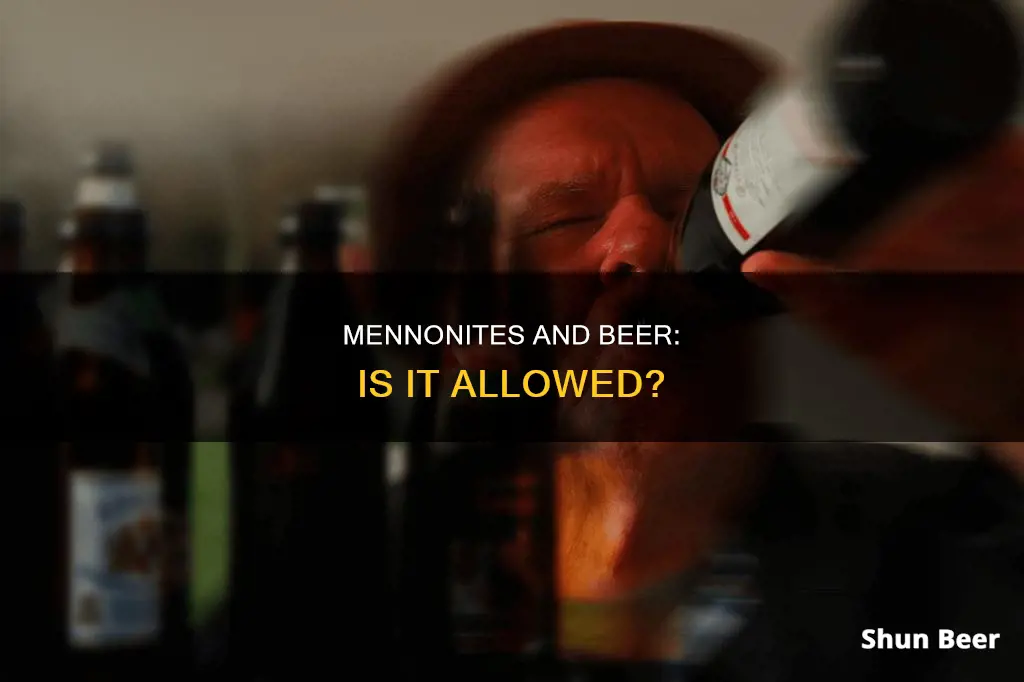
Mennonites are followers of Jesus, and his first miracle was turning water into wine at a wedding in Cana. So, it stands to reason that drinking wine or beer is not inherently forbidden for Mennonites. However, there is a complex history and varied attitudes towards alcohol consumption among Mennonites that is still evolving.
In the 16th century, leading church reformers like Luther complained about excessive drinking among Christians, and in 1527, the early Anabaptists took a firm negative stance, forbidding Anabaptists from entering drinking establishments. While this prohibition was sometimes difficult to follow, and not universally practised, warnings against drunkenness were common.
During the temperance movement of the 19th and 20th centuries, Mennonites largely became teetotalers, with some groups even using grape juice instead of wine for communion. However, this attitude has relaxed in recent decades, with younger and more urban Mennonites being more likely to drink alcohol. While some congregations still frown upon alcohol consumption, it is becoming more common for Mennonites to drink in moderation, and it is not uncommon to find beer or wine at family picnics.
| Characteristics | Values |
|---|---|
| Mennonite alcohol consumption | Mennonites' alcohol consumption has changed over time. While older and old-order Mennonites tend not to drink, urban and younger Mennonites are more likely to do so. |
| Mennonite alcohol consumption in history | In the 16th century, Anabaptists took a firm negative stance on alcohol consumption. In the 17th and 18th centuries, there were many brewers and distillers among Mennonites in Holland and Prussian settlements. In the 19th century, Mennonites in Russia commonly consumed alcohol. In the 20th century, most Mennonites became total abstainers. |
| Mennonite alcohol consumption today | Mennonites' views on alcohol vary today. Some Mennonites drink alcohol, while others abstain. Some congregations provide space and support for Alcoholics Anonymous (AA) groups. |
What You'll Learn

Mennonites and alcohol consumption through the years
Mennonites and alcohol consumption is a topic that has sparked much debate over the years, with varying attitudes and practices among different groups and individuals. While older and Old Order Mennonites generally abstain from alcohol, urban and younger Mennonites are more likely to drink. This difference often leads to criticism from older Mennonites, who tend to have more conservative views on alcohol consumption.
Historically, Germans in the Philadelphia countryside, including religious groups such as Mennonites, Brethren, Lutherans, and Reformed, tried to lead pious and conscientious lives. In the early years, distilling and moderate alcohol consumption were common, with most German farmers making wine and cider for home use through the 19th century. They also consumed non-alcoholic drinks like peppermint water and garden tea. However, with the growth of the Evangelical movement, strict temperance became the dominant view, especially among Mennonites and Brethren.
During the Temperance and Prohibition eras, many Mennonites ceased producing and consuming alcohol, signing "Family Temperance Pledges" in their Bibles. However, some continued to make small batches of wine from grapes, elderberries, and dandelions for home use. Notable Mennonite figures, such as Abraham Overholt, were involved in the distilling industry, and "Mennonite" was even used as slang for "tavern" in some places.
In the 20th century, the relationship between Mennonites and alcohol was influenced by the history of prohibition rather than Anabaptism. The Mennonite position on alcohol use has evolved since the 1950s, with more acculturated Mennonite groups becoming more accepting of moderate alcohol consumption. Despite this shift, suggesting that Mennonites should accept drinking as valid still sparks controversy, with some communities enforcing abstinence rules while others quietly relax them.
Overall, the topic of alcohol consumption among Mennonites has been a dynamic one, with changing attitudes and practices over the years, influenced by factors such as geographical location, generational differences, and the influence of broader cultural and religious movements.
Drinking Beer and Driving: What's the Legal Limit?
You may want to see also

Mennonites' current attitudes towards alcohol
Historically, Mennonites have had a complex relationship with alcohol. On the one hand, early Anabaptists took a firm negative stance against alcohol, with Article 4 of the Schleitheim Confession forbidding Anabaptists from entering drinking establishments. On the other hand, there were many brewers and distillers among Mennonites in Holland and Prussia during the 17th and 18th centuries, as it was one of the few occupations open to them.
In recent times, the Mennonite Church's attitude towards alcohol has relaxed, with a growing number of Mennonites accepting drinking in moderation as acceptable. A 2007 study found that only 26% of Mennonites considered drinking alcohol to be "always wrong," down from 50% in 1972 and 43% in 1989. This shift in attitude is reflected in the current Confession of Faith in a Mennonite Perspective, which shows a move away from abstinence and towards treating the body as a "temple of the Holy Spirit," crucifying "addictive behaviours."
However, there is still a notable generational divide, with older Mennonites tending to abstain from alcohol while younger Mennonites are more likely to drink. Additionally, there is a cultural silence around alcohol use and abuse within the Mennonite community, which can hinder open and honest discussions about the issue.
In conclusion, while Mennonite attitudes towards alcohol are diverse, there is a growing acceptance of moderate alcohol consumption within the community, although concerns about alcohol abuse, particularly among young people, remain prevalent.
Drinking Beer at Sheetz: What You Need to Know
You may want to see also

Mennonites' drinking habits in comparison to non-Mennonites
Mennonites' drinking habits vary depending on their congregation, age, and location. While some Mennonites are teetotalers, others consume alcohol, including beer, wine, and spirits, in moderation.
Historically, Mennonites have had a complex relationship with alcohol. Early Anabaptists, including Mennonites, took a firm negative stance against alcohol, with Article 4 of the Schleitheim Confession in 1527 forbidding Anabaptists from entering drinking establishments. However, complete abstinence was not universally practised or prescribed, with early Anabaptist leaders such as Menno Simons and Dirk Philips warning against drunkenness but not calling for total abstinence.
Over time, Mennonite attitudes towards alcohol have been influenced by various factors, including the temperance movement in mainline Protestantism, the evangelical movement, and cultural norms. During the 20th century, most Mennonites became total abstainers, and the use of unfermented grape juice instead of wine for communion became common. However, in recent decades, there has been a shift towards more permissive attitudes, with a growing number of Mennonites accepting moderate alcohol consumption.
Today, drinking habits among Mennonites vary. Older and Old-Order Mennonites tend to abstain from alcohol, while urban and younger Mennonites are more likely to drink. Some congregations and communities are known for their strict abstinence, while others are more relaxed and may even produce or sell alcoholic beverages.
In comparison to non-Mennonites, Mennonite drinking habits can be seen as more conservative and varied. While non-Mennonites may have a wider range of drinking habits, from abstinence to heavy consumption, Mennonites tend to lean towards moderation or abstinence due to religious and cultural influences. The presence of teetotalers and congregations that prohibit alcohol sets Mennonites apart from non-Mennonites, who may be more likely to view alcohol consumption as a personal choice or a social norm.
Additionally, the Mennonite community's internal debate about alcohol sets them apart from non-Mennonites. While non-Mennonite communities may also have differing views on alcohol use, the unique dynamics within Mennonite congregations, such as the tension between progressive and traditional members, make their drinking habits a complex and evolving topic.
Beer Drinking on Kure Beach: What's Allowed?
You may want to see also

The legal implications of Mennonite alcohol consumption
The Mennonite faith has a long and complicated relationship with alcohol that dates back to its earliest days. In the 16th century, the Anabaptist movement, which preceded what is now known as the Mennonite church, rejected the consumption of alcohol as an expression of its commitment to a life of simplicity and piety. This rejection of alcohol was carried over into the Mennonite church, and it remains a part of the church's doctrine to this day.
The Mennonite church has always recognised that individuals have the right to practice personal freedom of conscience in matters of faith and lifestyle. As such, the church has left it up to the individual to decide whether they will or will not consume alcohol. However, while Mennonites do not have a strict prohibition against drinking alcohol, there is a general consensus within the church that it is best to abstain from its consumption.
For example, older and more traditional Mennonites tend not to drink, and they may face ostracisation or other forms of discipline if they choose to consume alcohol. On the other hand, urban and younger Mennonites are more likely to drink, and they may face fewer consequences from their community. Additionally, some Mennonite communities may have a more relaxed stance on alcohol consumption, while others may prohibit it entirely.
It is also important to consider the legal context of the region where the Mennonite community is located. For example, during the period between 1900 and the 1940s in the United States, there was a growing movement towards prohibition, and many Mennonite Brethren supported the call for the prohibition of alcohol. In this context, Mennonites who chose to drink alcohol may have faced legal consequences under prohibition laws.
Today, the legal implications of Mennonite alcohol consumption are less clear-cut. While the Mennonite church discourages its members from participating in activities that involve the sale or promotion of alcohol, such as working in bars or liquor stores, it is ultimately up to the individual to decide whether to abide by these guidelines.
In conclusion, the legal implications of Mennonite alcohol consumption vary depending on the specific community and region. While there may be social consequences for members who choose to drink, there are generally no legal consequences unless prohibited by regional laws. Ultimately, it is up to individual Mennonites to decide how they will practice their faith and consume alcohol responsibly and in moderation.
Carnivore Diet: Beer Friend or Foe?
You may want to see also

The role of alcohol in Mennonite religious services
In the 17th and 18th centuries, brewing and distilling were common occupations among Mennonites in Holland and Prussian settlements, as these were some of the few trades open to them. During this period, moderate alcohol consumption was accepted, and many Mennonites produced wine and cider for home use. However, as evangelical and temperance movements gained traction in the 19th century, strict temperance became the dominant view, especially among Mennonites and Brethren.
In recent times, there has been a shift towards a more relaxed attitude towards alcohol within some Mennonite communities. While older and traditional Mennonites tend to abstain from alcohol, urban and younger Mennonites are more likely to consume alcoholic beverages. This shift is reflected in the changing language of Mennonite confessions, with the current "Confession of Faith in a Mennonite Perspective" adopted in 1995 moving away from abstinence and towards a focus on treating the body as a "temple of the Holy Spirit" and avoiding addictive behaviours.
While Mennonite religious leaders and congregations may have varying stances on alcohol consumption, it is clear that the role of alcohol in Mennonite religious services is influenced by a combination of historical traditions, cultural norms, and individual interpretations of faith.
Stale Beer: Is It Safe to Drink?
You may want to see also
Frequently asked questions
Mennonites' attitudes towards alcohol vary. While some Mennonite groups are very much against alcohol, others are quite accepting of it in various forms. Older and Old-Order Mennonites tend not to drink, but urban and younger Mennonites are more likely to do so.
In the 16th century, leading church reformers like Luther complained about excessive drinking among Christians. In 1527, the early Anabaptists took a firm negative stance, forbidding Anabaptists from entering drinking establishments. However, complete abstinence was not universally prescribed or practised. In the 17th and 18th centuries, there were many brewers and distillers among Mennonites in Holland and Prussian settlements, as brewing was one of the few occupations open to them. In the 19th century, moderate drinking was fairly common in Mennonite settlements in Russia. In the 20th century, most Mennonites became total abstainers due to the influence of temperance movements in mainline Protestantism.
The 1963 Confession of Faith adopted by the Mennonite Church General Conference states that Mennonites should "avoid such things as harmful drugs, beverage alcohol and tobacco." However, the current Confession of Faith in a Mennonite Perspective, adopted in 1995, shows a shift in attitude, stating that true faith means "treating our bodies as God's temples, rather than allowing addictive behaviours to take hold."
Attitudes towards alcohol among Mennonites are changing. While a large majority of Mennonites still accept some alcohol consumption, a significant minority continue to believe that abstention is a mark of faithfulness. In recent years, Mennonite publications have featured articles on Mennonite families starting vineyards and producing wine, which have sparked debates within the community.
Alcohol consumption varies among different Mennonite congregations and individuals. Some Mennonite groups are completely against alcohol consumption, while others may consume alcohol in moderation or even have a drinking culture. Urban and younger Mennonites are more likely to drink than older and Old-Order Mennonites.







